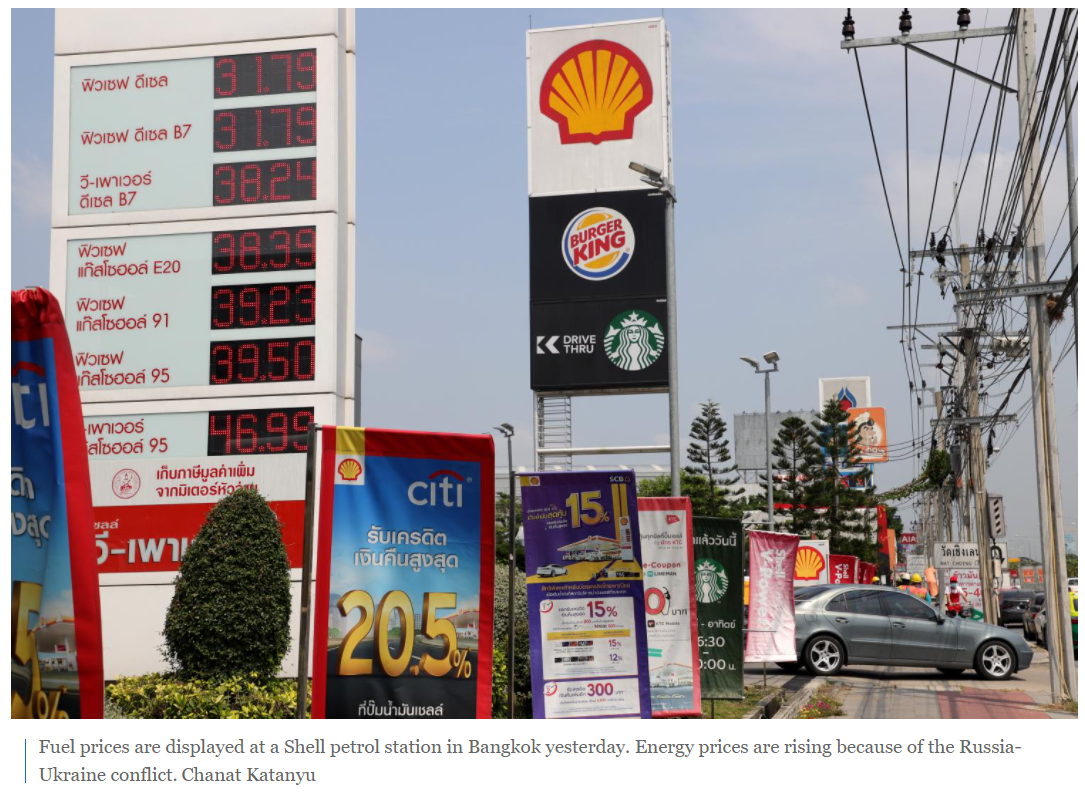Thailand: State mulls reply to oil price spike
The government has two choices to cope with the upsurge in global oil prices — borrow more money to continue price subsidies or let local oil prices spike — as the global price could soar to US$150 a barrel amid the Russia-Ukraine war.
“Authorities may have to let retail oil prices increase to better reflect market prices, or they need to use a lot more money from the Oil Fuel Fund to subsidise prices,” said Chairit Simaroj, managing director of SET-listed Susco, a local oil trader.
Brent crude rose near $130 a barrel amid a growing worry that global oil supply may decrease as a result of more possible sanctions on Russia, according to media reports.
Global oil prices have increased by more than 25% since Russia attacked Ukraine, said Mr Chairit.
“It’s possible global oil prices will keep increasing as the US and its European allies are mulling a ban on oil exports from Russia,” he said.
Analysts at Thai Oil Plc (TOP), Thailand largest oil refinery by capacity, voiced a similar concern as Russia is the world’s major oil exporter, supplying 4-5 million barrels of oil a day, or around 5-6% of global oil supply.
Opec and its allies decided after their March 2 meeting to increase oil production by only 400,000 barrels a day in April, rejecting a request by the US to increase supply to cool down prices, according to TOP.
“Additional oil exports from Iran may also face delay, causing supply fears,” said Mr Chairit.
If global oil prices eventually reach $150 a barrel, it will be the highest level since 2008, when prices skyrocketed to $147 per barrel.
Domestic oil prices have increased by around 4 baht a litre since the war began, putting a greater burden on the state Oil Fuel Fund, which caps diesel prices at below 30 baht a litre.
He said the government may opt to allow retail oil prices to slightly increase, putting them more in line with global prices and helping local oil retailers better cope with the ongoing price spike.
“The oil profit margin currently hit its lowest level, at less than one baht a litre,” said Mr Chairit.
“The government should allow retail prices to temporarily increase. Once the war eases and there is less pressure on global prices, it can go back to capping retail prices at certain levels again.”
This move would also help the government reduce its financial burden, while the measure to relieve the cost of living remains in place, he said.
Supant Mongkolsuthree, chairman of the Federation of Thai Industries (FTI), said both businesses and households will bear the brunt if global oil prices continue to increase to $150 a barrel.
“The cost of living and the inflation rate will all go up,” he said.
The FTI earlier suggested the government seek an additional loan of 1 trillion baht to support the Oil Fuel Fund and its stimulus packages.
Source: https://www.bangkokpost.com/business/2275367/state-mulls-reply-to-oil-price-spike


 English
English




